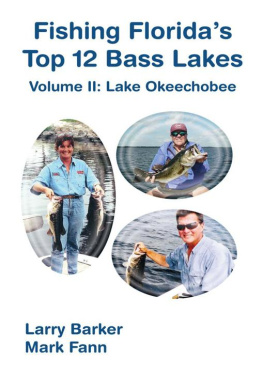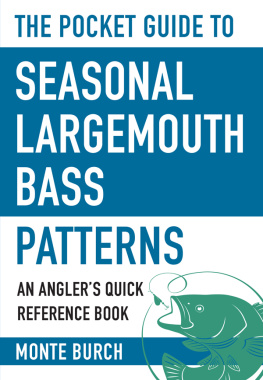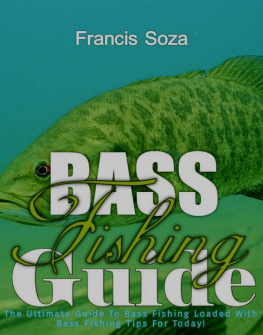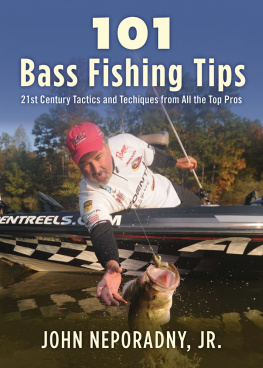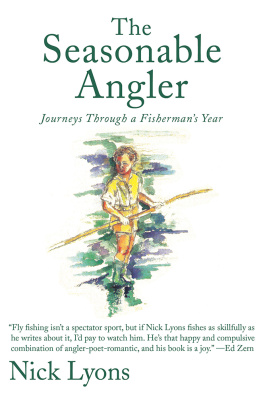Best of all he loved the fall.
THE FALL MIGRATORY ROUTE OF THE STRIPED BASS.
I dont advise peeing in your wet suit, shouted Paul Melnyk. Youll get a mean rash.
Ill keep that in mind, I hollered into the wind, my words quickly blown back into my face.
Truth was, whizzing in my neoprene bodysuit was the least of my worries. I was standing at the edge of the roiling Atlantic in Montauk, New York. Clouds covered the sliver of a moon, the chilly October night as black as the bottom of a well. In a few minutes I would follow Melnyk into the ocean.
We planned to lie on our backs, fishing rods held under our arms, and kick our way three hundred yards offshore. Once there, we would float on the current that ran parallel to the beach, casting live eels for striped bass. After we were carried for a half mile or so, we would kick back to where we started and begin the drift again. Melnyk, a Montauk local who invented this form of angling, calls it skishing (a cross between skiing and fishing, since large stripers often towed him like a water-skier). As one guide told me before my skishing adventure, Melnyk was on the extreme end of extreme.
The night before our trip, a surf fisherman, with both feet on shore, had landed a fifty-pound striper, and Melnyk wanted to best that mark. He was sure the fish was an indication of a school of trophy striped bass in the area. There was no turning back. We huddled behind a large dune to zip our wet suits and run through an equipment check. Headlamp? Check. Whistle? Check. Pliers? Check. Knife? Check.
If a shark grabs me, I expect you to fight him off with your knife, said Melnyk, trying to loosen up the situation. His levity was lost on me. I knew enough about the area to realize that the threat of sharks was no joke. A little more than a decade back, a Montauk charter boat had landed a monstrous great white (seventeen feet, 3,427 pounds) that had been snacking on a dead whale not far from the point, and just that summer a fourteen-foot mako had been pilfering stripers from the ends of fishermens lines and ramming boats near Cape Cod. Up and down the East Coast, 2001 had been the summer of the shark.
There were also rip currents, some of which ran at eight knots. If we got caught in the wrong place, we would be shot out into the ocean as if on a water-park ride.
Lets do this before I chicken out, I said.
Okay. Remember, this is a shore break. Its dangerous surf. These waves can pick you up and slam you on the beach. Itll ruin your week. Once we clear them its easy sailingmake that kicking.
We waded in. The surf zone was a cauldron of white water, and beyond it the seas lumps melded with the sky. When the water reached our knees, we dropped on our backs and pulled on our flippers. With the waves rushing to shore, it was a clumsy endeavor, and twice I rolled face first into the water before succeeding.
Ready? yelled Melnyk.
Ready.
Kick, kick, kick, kick.
When my flippers gained purchase, I zipped ahead into the wash.
Stay with me, Dave.
We were kicking side by side when the first breaker rushed over us. I swallowed a mouthful of seawater and bobbed to the surface. Melnyk hooted with delight. The next wave lifted me up and carried me tumbling back where Id started.
Come on, Dave. Kick, kick, kick! coaxed Melnyk. I gathered myself and pushed off again. In less than thirty seconds we were out of the surf, rising and falling on the choppy waves of the ocean. At fifty-six degrees, the water breaching our wet suits was breath-stealing.
Is this living or what? screamed Melnyk. Were on the edge, man.
How much farther?
About a hundred kicks.
On the crest of each wave I could see the shore. TV sets were flashing muted blues and reds in the windows of the beach motels above the dunes. I found myself envious of the occupants, who had little fear of disappearing into the Atlantic. Suddenly there was a surface commotion just in front of our heads, like a broom slapping the water. Just a flock of sea ducks riding out the weather, said Melnyk. We probably scared the shit out of them.
Likewise.
Eventually Melnyk yelled, Were here, man. We stopped kicking. The thick wet suits provided enough buoyancy to keep us chest high in the gin-clear water. I flipped my headlamp on; it illuminated a circle in front of me, the strobe reaching toward the bottom. I could see my purple flippers flexing as I flutter-kicked to stabilize myself. I wondered what could see me from below, and inched closer to Melnyk.
Melnyk kept each eel in an individual sandwich-size Ziploc bag for easy handling. He passed one to me. It squirmed within its plastic confines as I hooked it through the jaw. With the hook in place I pulled hard, ripping the bag and freeing the eel. It danced on the end of my line. If I didnt cast soon, it would tie itself and the line into a slimy knot.
I turned my light off. Melnyk already had his eel in the water. He was floating about ten feet from me. His black neoprene hood combined with his surf rod rising from the surface made him look like a seagoing knight, his trusty steed a sea creature from Proteuss flock. As I went to cast, Melnyks rod quivered, then bent deeply. He reared back on the fish, then yelled, Oh baby, theyre here.
In 1954 the editors of Salt Water Sportsman declared that the striped bass had a fanatical human following that compares to none. If Paul Melnyk is any indication, the striped-bass fervor is stronger half a century later. Its estimated that on the East Coast more than three million fishermen pursue the fish. Feeding the passion is a striper population that has soared to a 150-year high after experiencing a near total collapse in the early 1980s. The reasons for the decline were legionfrom overharvesting to pollution of the spawning groundsbut thankfully legislation and the resiliency of the striper helped reverse the damage. The stock resurgence was in full swing when I joined the striper faithful in 1995 not long after I moved to New York City to begin my career as a journalist.
Having grown up on the banks of a coastal river in Savannah, Georgia, fishing was as much a part of my character as my southern accent. I spent the days of my youth immersed in the pursuit of fish. The walls of my room teemed with photos of sea life clipped from sporting magazines: Sailfish herded bait with their electric-blue dorsal fins; giant bluefin tuna rose from the depths; redfish tails wagged above the surface. On the ceiling above my bed, next to a shark jaw suspended on a piece of fishing line, I tacked a chart of the local waters. I liked to study it before I went to sleep. One night my father opened my bedroom door. He inquired about my homework, then took a good look around. You know, Dave, he said, at this age your brothers had posters of women on the walls.
Instead of fast-food joints or lifeguard stands, I found work on the decks of private and charter fishing boats. Every time I sank the gaff in an especially green or wildly thrashing fish aboard the Captain D, a thirty-foot charter boat, my boss would turn to our party and say, with pride, That, folks, is a sign of a misspent youth. When it came time to choose between two colleges I wanted to attend in New England, I opted for the school surrounded by the best trout water.



